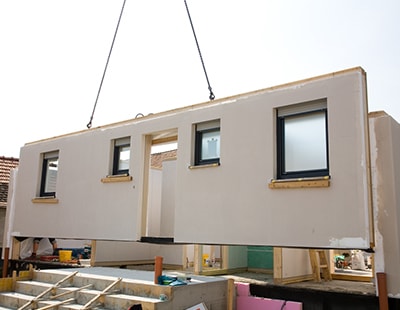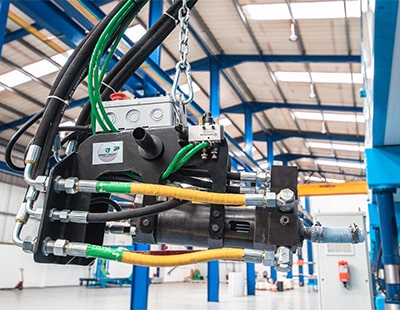“What is undeniable is that MMC projects are quicker, but this is not demonstrated sufficiently, because there is minimal benchmark data available," Ian Dacre said.
Where does MMC fit in the UK today?
The UK building industry is increasingly employing Modern Methods of Construction (MMC), evidenced by the growing number of build projects for residential, industrial, and public sector/commercial property. This growth is driven by the need to build more homes to address the housing crisis, for garden offices and emergency buildings generated by the Covid situation, and for more and extended public and private sector industrial/commercial buildings.
Within the industry, there are passionate advocates of modern offsite construction, using materials such as Structural Insulated Panels (SIPs); however, much work needs to be done to convince others, including at the time of writing, most architects, quantity surveyors and contractors, to shift - when it benefits the project - from traditional methods.
What are the challenges of assessing the overall value of MMC projects?
“There is limited data available; although there are many publications which discuss the pros and cons of MMC,” explains Dacare. "There is nothing to date published on the commercial aspects."
“So, it is a challenge, but there are some principles we can follow, so that we can start to create a bank of knowledge relating to the cost, value and performance of MMC projects:
Value: In terms of assessing value, there are two aspects:
o capital value
o whole life value
Whilst they are totally different; they should nonetheless be viewed as one, because it is critical to understand the full cost both of constructing and maintaining a building, if we are looking at the benefit of the whole project. It is impossible to do so by taking the capital value alone.
Cost: We need to ask ourselves; how do we benchmark a quotation or programme-saving offered from an MMC provider?
Performance: We must use the MMC providers’ information as there is no historic data available at present.
“In conclusion, we need the experts – the MMC providers – to supply the information. Once it becomes widely available in the marketplace and everyone can access it, this will enable us to benchmark projects – it will be a major step forward.”
How can an assessor accurately estimate the total costs? For example, the impact of greater construction speed?
“There are tools available. Programme management can demonstrate the time efficiency savings, but at the moment, we also need to factor lead in times. One of the problems we have is that sites cannot manage the speed of MMC."
It would appear that sites are not set up for how quickly materials arrive and are installed; this leads to sites not being ready, tradespeople not being in place and other delays. This is where education in process is needed, so that programme management works properly.
“Whole Life Cost (WLC) models can generate the occupancy costs over a period of time, but again, as with any kind of research data, we need several MMC projects to be built and monitored over time to see the overall effects,” Dacre asserts.
What data is needed and how does the industry get it?
“Unfortunately, the amount of current data is minimal and is not widely available. Generally, most is based on a historic project people are familiar with but which is not documented," Dacre says.
“Cost data for capital expenditure is not readily available in the marketplace when compared to other materials and structural solutions, which have been used and documented for many years.
“There are many reports, papers and magazine articles that bestow the benefits of MMC and possibly things to watch out for, but nothing as yet on cost and whole life value.
“It is possible to obtain information on lead-in times, delivery times and erection times from MMC suppliers, but it is difficult to get accurate cost information,” Dacre adds.
What are the ‘hidden costs’ in estimating for traditional methods that get overlooked when compared with MMC?
“The hidden costs include waste, and redoing things on site, both of which stem from a lack of understanding. One could also argue that there are possible inefficiencies due to the external environment in which people are working, such as weather. These are not really hidden, but are inherent in the programme where the main construction process takes place outdoors.”
Hemsec team members have seen costs being added where firms have used unnecessary materials, because they don’t understand the way SIPs work. For example, people use them for cladding inside a wall, roof or ceiling made from different materials, not realising that the SIP itself is structural and is a full supporting wall with insulation built in.
How do we persuade professionals to recognise this when comparing with MMC?
“When it comes to the perceived lack of understanding; when someone does not understand something or it has not been demonstrated sufficiently or proven, a risk factor may be applied.
“This is potentially unfair to the MMC solution, but it is down to knowledge and experience, which can only be gained by undertaking projects, and having benchmark data readily available.”
So, until there is benchmark data available it is going to be chicken and egg, and down to the individual architect and quantity surveyor to take the leap.
SIPs are frequently used in MMC projects, yet for those not familiar with them, their basic cost is often compared with traditional products. How logical is this?
“The costs need to be looked at as part of a whole method in order to answer this question. As users, my firm knows the benefits and the hidden cost-savings that result in overall reductions later in the build programme. So, even if SIPS appear more expensive initially, people build with them because they fully understand the all-round benefits including the speed of construction, the whole of life costs including running and maintenance, and the environmental gains."
How can professionals learn about the benefits of MMC in the meantime?
“The benefits are out there if you choose to look. I think one of the inhibitions felt by professionals is a fear that they may be losing control of design, maybe, and possibly losing control of a key programme deliverable.
“Having said that, transference of risk of this element has to be a huge benefit especially when PI levels are increasing dramatically. I know the SIPS suppliers will have PI to cover, but this is more of a discrete market, with specialists designing a specific product, frame or panel.
“As to how people learn; in my opinion, all forms of communication which transfer knowledge to others is going to help bring change about. I was invited to an MMC factory visit last year. Preceding the visit, we had a quick presentation by the company of what they did and how they did it, etc; however, there was nothing about cost and value. We can all discuss the opportunities (and maybe risks) with MMC, but without costs the jigsaw is not complete.”
*This is an edited version of the full Hemsec interview with Ian Dacre, which can be viewed here









.png)










Join the conversation
Be the first to comment (please use the comment box below)
Please login to comment